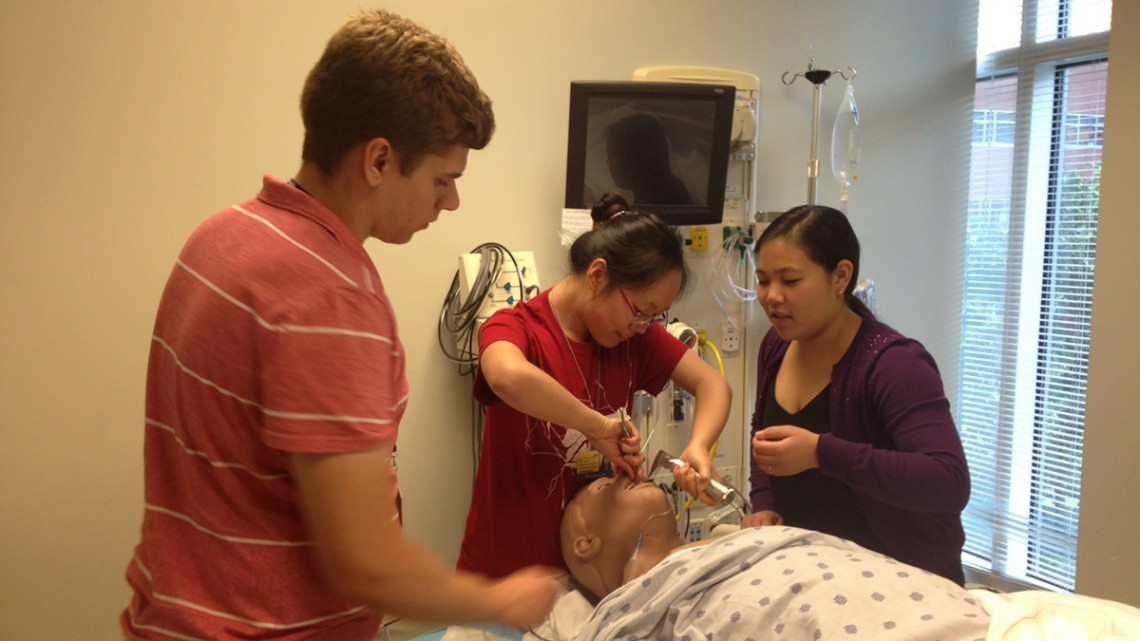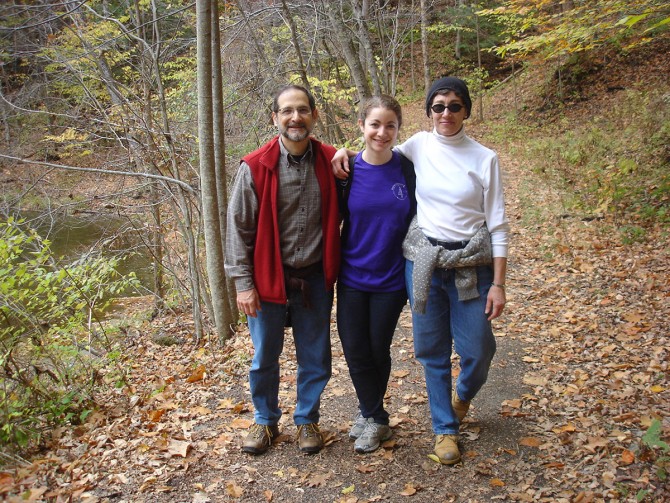
Interns practice intubating a mannequin in the simulation center at Johns Hopkins University School of Medicine, where Hank Fessler ’77 is a professor of medicine, assistant dean and director of a fellowship training program.
A&S alum hosts medical school interns for summer experiences
By Kathy Hovis
Every summer for the last six years, College of Arts and Sciences alumnus Hank Fessler ’77 has welcomed a group of Cornell students to Johns Hopkins University School of Medicine, where they join research labs and immerse themselves in a season of exploration about their future careers in medicine.
Fessler, a professor of medicine, assistant dean for undergraduate medical education and director of the Fellowship Training Program in Johns Hopkins Pulmonary and Critical Care Medicine, provides some funding for stipends, hosts students for a cookout, sets up opportunities for them to shadow medical staff and plans part of a day touring on campus.
“This is a way I can contribute and really see the impact of my contribution,” Fessler says. “I can meet the students and see how this experience helps them make medical or graduate school decisions and then career decisions.”
Students participate in lab meetings, weekly journal clubs and present their work in a poster symposium at summer’s end. The program also includes coaching on oral and poster scientific presentations and the opportunity for a mock graduate school/medical school admissions interview.
Clara Liu ’19, who is interested in computer science and biology, spent part of her summer developing a basic computer script to help speed up comparisons between genes and genomes.
“I was so happy when the grad student who supervised me thanked me for saving so much of his time,” Liu says. “That was when I realized how even in a basic science lab, programming skills could be used to greatly improve efficiency on certain projects.”
Fessler’s gift is combined with other alumni gifts to enable three Cornell students to come to Johns Hopkins each summer. Fessler also has made some fortuitous introductions at Weill Cornell Medicine so undergraduates could intern there as well – formalizing, through the undergraduate biology office, the first internships at WCM specifically for Cornell students studying the biological sciences.
“As someone who wanted to pursue medicine, it was incredible being part of an institution where so much history and current groundbreaking work in medicine was taking place,” says Mark Ren ’16, an intern from 2015, now a first-year medical student at Johns Hopkins. “In my basic science lab, I learned about not just my particular field of interest, neurodegenerative disease on the molecular level, but also about how research and careers in research really work.”
Michelle Jin ’17, an intern from 2016, had a similar experience.
“The summer broadened my interests in medicine and I became more open to any kind of medicine,” Jin says. “[It] definitely contributed to my interest in neuroscience, but I also took time to shadow different medical specialties in psychiatry, neonatal care and cardiology.”
Fessler says such intern programs were less accessible when he was a Cornell undergrad.
“I knew I liked biology, so I majored in that, then I kind of backed into medicine,” he says. “In medical school, I had no inclination of being an academic physician or even any understanding of what that was. My goal was to be a primary care practitioner in a rural setting.”
But after attending medical school at Rutgers University and a residency program that largely trained primary care physicians, he ended up at Hopkins for a fellowship in pulmonary and critical care.
“For me and a lot of people who stay in academic medicine, the constant variety makes it more exciting,” he says. “You’re focusing on research, then seeing patients, then you have a course to teach. You’re always challenged by trainees to stay at the top of your game.”
Ashley Chan ’18 says the summer experience at Johns Hopkins provides a taste of the day-to-day life of a researcher and “has exposed me to a brand-new field of research in cardioprotection and taught me many new techniques for analysis,” she says. “However, more importantly, I have learned to think, ask questions and problem-solve like a scientist.”
Says Brady Bunkelman ’19, who’s interested in a research career: “The summer experience definitely confirmed my interest in attending grad school and going for a Ph.D. I gained confidence in my laboratory techniques and learned more about various subjects I could explore in grad school.”
“This is one of the most satisfying things I’ve done,” Fessler says. “I really enjoy sustaining my connection to the university, and the excitement of the students who come here is infectious.”
Kathy Hovis is a writer for the College of Arts and Sciences.
Media Contact
Get Cornell news delivered right to your inbox.
Subscribe
